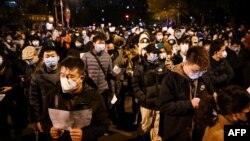ບັນດາມະຫາວິທະຍາໄລຕ່າງໆຂອງປະເທດຈີນ ສົ່ງພວກນັກສຶກສາກັບຄືນບ້ານ ໃນຂະນະທີ່ພັກຄອມມູນິສ ຊຶ່ງເປັນພັກລັດຖະບານທີ່ປົກຄອງປະເທດ ຄວບຄຸມການຕໍ່ຕ້ານໄວຣັສຢ່າງເຄັ່ງຄັດ ແລະພະຍາຍາມຫາທາງປ້ອງກັນເພີ້ມຂຶ້ນ ບໍ່ໃຫ້ ການປະທ້ວງ ຫລັງຈາກຝູງຊົນທີ່ໂກດແຄ້ນທີ່ເກີດຈາກຂໍ້ກຳນົດທີ່ເຄັ່ງຄັດເພື່ອໃຫ້ ມີ “ສູນກໍລະນີໂຄວິດ” ໄດ້ຮຽກຮ້ອງໃຫ້ທ່ານສີ ຈິ້ນຜິງ ລາອອກຈາກຕຳແໜ່ງ ຊຶ່ງສະແດງໃຫ້ເຫັນໃນຄວາມບໍ່ພໍໃຈຂອງປະຊາຊົນທີ່ໃຫຍ່ສຸດ ກັບຄວາມບໍ່ເຫັນພ້ອມ ໃນຫລາຍທົດສະວັດ ອີງຕາມລາຍງານຂອງອົງການຂ່າວເອພີ.
ພ້ອມດ້ວຍການສົ່ງກຳລັງຕຳຫລວດ ອອກມາຢ່າງຫລວງຫລາຍ ບໍ່ໄດ້ມີລາຍງານກ່ຽວກັບການປະທ້ວງໃນວັນອັງຄານມື້ນີ້ໃນນະຄອນປັກກິ່ງ ຊຽງໄຮ້ ຫລືບັນດາຫົວເມືອງອື່ນໆ.
ການຈຳກັດຮັດແຄບຕ້ານໄວຣັສຈຳນວນນຶ່ງ ໄດ້ມີຜ່ອນຜັນລົງໃນວັນຈັນວານນີ້ ໃນຄວາມພະຍາຍາມ ທີ່ອາດເປັນໄປໄດ້ ເພື່ອລະງັບຄວາມໂກດແຄ້ນຂອງສາທາລະນະຊົນ ຫລັງຈາກມີການປະທ້ວງໃນວັນເສົາແລະວັນອາທິດ ຢູ່ໃນຢ່າງໜ້ອຍແປດເມືອງ. ແຕ່ວ່າພັກຄອມມູນິສຍັງຢືນຢັນຍຸດທະສາດ “ສູນກໍລະນີໂຄວິດ” ຂອງຕົນ ທີ່ໄດ້ກັກຂັງຫລາຍລ້ານຄົນ ໃຫ້ຢູ່ໃນບ້ານເຮືອນເຂົາເຈົ້າ ໃນຄວາມພະຍາມເພື່ອ ແຍກທຸກໆການຕິດແປດ.
ມະຫາວິທະຍາໄລຊິງຫົວ ຊຶ່ງເປັນມະຫາວິທະຍາໄລຂອງທ່ານສີ ບ່ອນພວກນັກສຶກສາພາກັນປະທ້ວງໃນວັນອາທິດທີ່ຜ່ານມາ ແລະບັນດາໂຮງຮຽນຕ່າງໆໃນປັກກິ່ງ ແລະຢູ່ແຂວງກວງດົງທາງພາກໃຕ້ຂອງປະເທດ ໄດ້ກ່າວວ່າເຂົາເຈົ້າໄດ້ປ້ອງກັນບໍ່ໃຫ້ພວກນັກສຶກສາຕິດໂຄວິດ-19. ແຕ່ໄດ້ປ່ອຍເຂົາເຈົ້າອອກເມືອບ້ານແລະຍັງຫລຸດຜ່ອນການເຄື່ອນໄຫວ ຫລັງຈາກການປະທ້ວງຢູ່ໃນບັນດາມະຫາວິທະຍາໄລໃນອາທິດທີ່ຜ່ານມາ.
ມະຫາວິທະຍາໄລຈຳນວນນຶ່ງຈັດແຈງໃຫ້ລົດບັສນຳພາພວກນັກສຶກສາໄປສົ່ງຢູ່ສະຖານີລົດໄຟ. ເຂົາເຈົ້າກ່າວວ່າ ບັນດາຫ້ອງຮຽນ ແລະການສອບເສັງສຸດທ້າຍຈະປະຕິບັດທາງອອນລາຍ.
"ພວກເຮົາຈະຈັດແຈງໃຫ້ພວກນັກສຶກສາທີ່ເຕັມໃຈກັບຄືນເມືອບ້ານເຮືອນຂອງເຂົາເຈົ້າ” ທີ່ມະຫາວິທະຍາໄລປ່າໄມ້ປັກກິ່ງ ໄດ້ກ່າວຢູ່ໜ້າເວັບໄຊ ແລະກ່າວວ່າ ບັນດາຄູອາຈານ ແລະນັກສຶກສາທັງໝົດໄດ້ກວດບໍ່ມີໄວຣັສ.
ບັນດາມະຫາວິທະຍາໄລໄດ້ເປັນບ່ອນເຕົ້າໂຮມຂອງພວກນັກເຄື່ອນໄຫວລະຫວ່າງການຊຸກຍູ້ໃຫ້ມີການປະຕິຮູບປະຊາທິປະໄຕ ໃນຊຸມປີ 1980 ທີ່ໄດ້ນຳພາໂດຍຂະບວນການຂອງພວກນັກສຶກສາໃນປີ 1989 ຢູ່ຈະຕຸລັດທຽນອັນເໝີນໃນນະຄອນຫຼວງປັກກິ່ງ ທີ່ໄດ້ຖືກທັບມ້າງໂດຍທະຫານ.
ໃນການສົ່ງພວກນັກສຶກສາກັບຄືນບ້ານ ພວກເຈົ້າໜ້າທີ່ຫວັງວ່າ ຈະ “ຫຼຸດຜ່ອນສະຖານະການ” ນັ້ນຄືຄຳເວົ້າຂອງທ່ານດາລີ ຍັງ ຜູ້ຊ່ຽວຊານການເມືອງຢູ່ມະຫາວິທະຍາໄລຊິຄາໂກ ໄດ້ກ່າວ.
Chinese universities are sending students home as the ruling Communist Party tightens anti-virus controls and tries to prevent more protests after crowds angered by its severe "zero COVID" restrictions called for President Xi Jinping to resign in the biggest show of public dissent in decades.
With police out in force, there was no word of protests Tuesday in Beijing, Shanghai, or other major cities.
Some anti-virus restrictions were eased Monday in a possible effort to defuse public anger following the weekend protests in at least eight cities. But the ruling party affirmed its "zero COVID" strategy, which has confined millions of people to their homes in an attempt to isolate every infection.
Tsinghua University, Xi’s alma mater, where students protested Sunday, and other schools in Beijing and the southern province of Guangdong said they were protecting students from COVID-19. But dispersing them to far-flung hometowns also reduces the likelihood of more activism following protests at campuses last weekend.
Some universities arranged buses to take students to train stations. They said classes and final exams would be conducted online.
"We will arrange for willing students to return to their hometowns," Beijing Forestry University said on its website. It said its faculty and students all tested negative for the virus.
Campuses were hotbeds of activism during the last push for democratic reforms in the 1980s, culminating in the 1989 student-led movement centered on Beijing’s Tiananmen Square that was crushed by the army.
By sending students home, authorities hope to "defuse the situation," said Dali Yang, an expert on Chinese politics at the University of Chicago.




